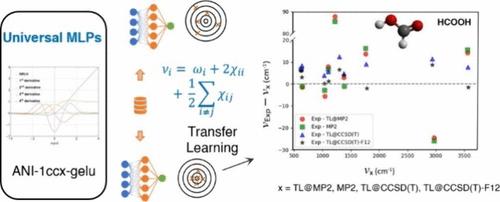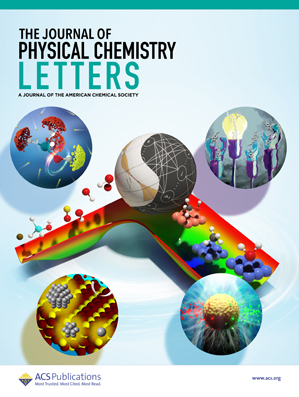ANI-1ccx-gelu Universal Interatomic Potential and Its Fine-Tuning: Toward Accurate and Efficient Anharmonic Vibrational Frequencies
IF 4.8
2区 化学
Q2 CHEMISTRY, PHYSICAL
引用次数: 0
Abstract
Calculating anharmonic vibrational modes of molecules for interpreting experimental spectra is one of the most interesting challenges of contemporary computational chemistry. However, the traditional QM methods are costly for this application. Machine learning techniques have emerged as a powerful tool for substituting the traditional QM methods. Universal interatomic potentials (UIPs) hold a particular promise to deliver accurate results at a fraction of the cost of the traditional QM methods, but the performance of UIPs for calculating anharmonic vibrational frequencies remains hitherto unknown. Here we show that despite a known excellent performance of the representative UIP ANI-1ccx for thermochemical properties, it fails for the anharmonic frequencies due to the original unfortunate choice of the activation function. Hence, we recommend evaluating new UIPs on anharmonic frequencies as an additional important quality test. To remedy the shortcomings of ANI-1ccx, we introduce its reformulation ANI-1ccx-gelu with the GELU activation function, which is capable of calculating IR anharmonic frequencies with reasonable accuracy (close to B3LYP/6-31G*). We also show that our new UIP can be fine-tuned to obtain very accurate anharmonic frequencies for some specific molecules but more effort is needed to improve the overall quality of UIP and its capability for fine-tuning. The new UIP will be included as part of our universal and updatable AI-enhanced QM methods (UAIQM) platform and is available together with usage and fine-tuning tutorials in open-source MLatom at https://github.com/dralgroup/mlatom. The calculations can also be performed via a web browser at https://XACScloud.com.

求助全文
约1分钟内获得全文
求助全文
来源期刊

The Journal of Physical Chemistry Letters
CHEMISTRY, PHYSICAL-NANOSCIENCE & NANOTECHNOLOGY
CiteScore
9.60
自引率
7.00%
发文量
1519
审稿时长
1.6 months
期刊介绍:
The Journal of Physical Chemistry (JPC) Letters is devoted to reporting new and original experimental and theoretical basic research of interest to physical chemists, biophysical chemists, chemical physicists, physicists, material scientists, and engineers. An important criterion for acceptance is that the paper reports a significant scientific advance and/or physical insight such that rapid publication is essential. Two issues of JPC Letters are published each month.
 求助内容:
求助内容: 应助结果提醒方式:
应助结果提醒方式:


